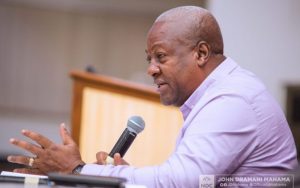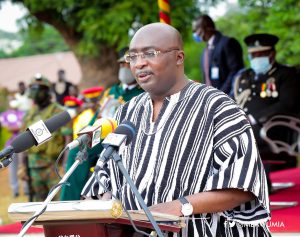If elected president, John Dramani Mahama, the flagbearer of the National Democratic Congress (NDC), has pledged to look into the government’s gold-for-oil policy.
He argues that a detailed investigation is necessary because the arrangement is opaque.
In 2021, the government implemented the gold-for-oil agreement in response to the depreciation of the cedi and the increase in fuel prices.
Speaking at the University of Energy and Natural Resources (UENR) in Sunyani for the 3rd Annual Transformational Dialogue on Small-scale Mining, Mr. Mahama says the agreement will be reexamined.
“We will investigate the opaque gold for oil programme and expose the actors benefiting from this so-called barter agreement. Reports reaching me suggest that a new debt burden is being created because Ghana has not been able to keep up with its delivery of gold under the programme.”
With the Cedi weakening and living expenses rising, Vice President Mahamudu Bawumia announced the policy in 2022 as a response to Ghana’s diminishing foreign exchange reserves and the demand for dollars from oil importers.
In order to relieve pressure on the Cedi, stop the fuel price explosion, and address the balance of payments issues, Ghana plans to sell gold in order to secure oil at a competitive price through the G4O program.
The PMMC is aiming to purchase at least 160,000 ounces of gold per month, valued at approximately $300 million, which could help purchase roughly 50% of the nation’s monthly oil demand. By March 2023, more than 60,000 ounces of gold valued at over $97 million had been purchased from local mines.







